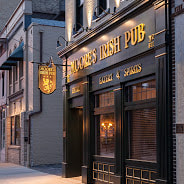Gordon Meredith Lightfoot Jr. CC Ont (born November 17, 1938)[1] is a Canadian singer-songwriter and guitarist who achieved international success in folk, folk-rock, and country music. He is credited with helping to define the folk-pop sound of the 1960s and 1970s.[2] He is often referred to as Canada's greatest songwriter[3] and is known internationally as a folk-rock legend.[4][5]
Lightfoot's songs, including "For Lovin' Me", "Early Morning Rain", "Steel Rail Blues", "Ribbon of Darkness"—a number one hit on the U.S. country chart[6] with Marty Robbins's cover in 1965—and "Black Day in July," about the 1967 Detroit riot, brought him wide recognition in the 1960s. Canadian chart success with his own recordings began in 1962 with the No. 3 hit "(Remember Me) I'm the One", followed by recognition and charting abroad in the 1970s. He topped the US Hot 100 or AC chart with the hits "If You Could Read My Mind" (1970), "Sundown" (1974); "Carefree Highway" (1974), "Rainy Day People" (1975), and "The Wreck of the Edmund Fitzgerald" (1976), and had many other hits that appeared in the top 40.[7]
Robbie Robertson of the Band described Lightfoot as "a national treasure".[9] Bob Dylan, also a Lightfoot fan, called him one of his favorite songwriters and, in an often-quoted tribute, Dylan observed that when he heard a Lightfoot song he wished "it would last forever".[10] Lightfoot was a featured musical performer at the opening ceremonies of the 1988 Winter Olympic Games in Calgary, Alberta. He received an honorary Doctor of Laws degree from Trent University in Spring 1979 and was made a Companion of the Order of Canada in May 2003.[11][12] In November 1997, the Governor General's Performing Arts Award, Canada's highest honour in the performing arts, was bestowed on Lightfoot.[13] On February 6, 2012, Lightfoot was presented with the Queen Elizabeth II Diamond Jubilee Medal by the Lieutenant Governor of Ontario. June of that year saw his induction into the Songwriters Hall of Fame.[14][15] On June 6, 2015, Lightfoot received an honorary doctorate of music in his hometown of Orillia from Lakehead University.[16]
Contents

